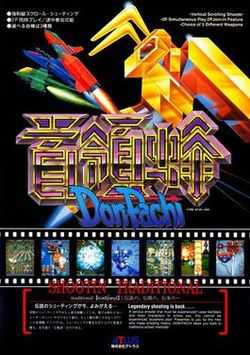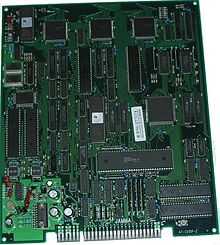DonPachi
| DonPachi | |
|---|---|
 | |
| Developer(s) | Cave Falcom (SS) |
| Publisher(s) |
|
| Series | DonPachi |
| Platform(s) | Arcade, PlayStation, Sega Saturn, PlayStation Network |
| Release date(s) | |
| Genre(s) | Shoot 'em up / Manic shooter |
| Mode(s) | Single-player, Multiplayer |
| Cabinet | Upright |
| Arcade system | Cave 1st generation |
| Display | Raster, 240 x 320 pixels (Vertical), 2048 colors |
DonPachi (首領蜂 DonPachi, A play on the words "Leader Bee" and "Gunfire") is a vertically scrolling manic shooter video game developed by Cave and published by Atlus in 1995. It was the first game developed by Cave, and the second on Cave's first generation arcade hardware (the first being Power Instinct 2). Literally translated, the title means "leader bee", but it is also a Japanese onomatopoeic expression associated with the sound of firing guns. It is one of the first manic shooters. This game received a sequel in the form of DoDonPachi.
Plot

The game's premises differ somewhat by most of its brethren: the player assumes the role of a pilot whose mission is to actually survive an eight years long training mission, where he/she is supposed to prove his/her worth as a fighter and gain entry to the future elite squadron known as the DonPachi Squadron - which is featured prominently throughout the entire series. The twist lies in the fact that the enemies are, in truth, the player's very own comrades, posing as enemies and sacrificing their lives for the sake of allowing only the most skilled pilots to pass the test, and survive.
The player flies their selected fighter over 5 areas of various terrain, encountering a number of land, sea and air enemies. The player's ship has two modes of fire: by tapping the fire button, shots are fired; holding it down produces a concentrated vertical beam, but also reduces the ship's speed.
Gameplay
Fighters
The player can choose one of three aircraft at the start of the game, or upon continuing:
- Type A: A red (or yellow/orange, for player two) fighter, which fires a narrow stream of shots
- Type B: A green (or purple, for player two) helicopter, which fires its main guns forward, but has side guns rotates up to 90 degrees from forward when fighter moves horizontally
- Type C: A blue (or black, for player two) fighter, which fires a wide, three-way spread of shots
Weapons
- Shots: Tap shot button to fire. The placement of the guns is unique on each ship:
- On the red fighter, the shots circle around of the craft firing forward, combining their firepower with the fighter's main guns.
- On the green helicopter, the shots (which, like the helicopter, use blades to hover) are positioned directly to the left and right, and can turn in the direction that the player moves to provide sweeping fire.
- On the blue fighter, the shots are near the rear, and angled outward, providing three-way widespread fire.
- Laser: Hold shot button. The floating guns combine in front of the ship to produce a vertical beam, which provides more firepower than standard fire. This also makes the ship move slower. When using the laser, an aura is generated around the player, which does the same damage to enemies as the laser.
- Spread Bomb: Press bomb button when not holding shot button. It produces a large explosion which damages or destroys all enemies on screen, and makes all enemy projectiles disappear for the entire duration of the explosion.
- Laser Bomb: Press bomb button when firing laser. It inflicts more damage than Spread Bomb, but with narrower attack angle. Enemy projectiles in the beam's range will be destroyed. In boss battle, the attack causes recoil that pushes the player's ship to the bottom of the screen.
The player's available bomb stock depends on number of bomb slots the player possesses; a player starts with 3. Between stages (or if the player continues), all the slots are filled. The player can gain slots by using 3 bombs, for maximum of 7 slots; when the player loses a life, the next non-continued life starts with 3 of those. Continuing does not change the existing bomb slot count.
Areas
The game has 5 areas, which can be "looped" if the player succeeds in completing them. The second loop has the same areas, enemy patterns, and bosses as the first loop, but enemies fire denser bullet patterns as well as explode into bullets when destroyed (sometimes called 'suicide bullets' or 'ricochet effect'). However, if enemies are destroyed with the player's ship nearby, such bullets disappear. Destroying the final boss in the second loop unlocks a secret area where you fight the trademark boss of the series, the giant mechanical bee Hachi (蜂; 'bee').
After completing the first loop, the storyline reveals that the commander tells the pilot to continue the missions of fighting against the fellow troop members until one side is completely destroyed, with the game's second loop beginning 7 years later. After defeating Hachi, the story reveals the commander's 'mission' was to turn the existing army into a race of super soldiers. However, since the missions are aerial attacks, many soldiers have taken battles into air and performed the ultimate sacrifices. It was the many lives that have lost in the process that made the mission a success. As a result, a new elite combat force called 'DonPachi' was formed.
Collectible items
There are three types of power-up items in the game, identified by different letters:
- P: Makes the player's guns stronger and laser thicker. Two of these items must be collected for one level of power-up; when the first is collected, the player's shots turn darker in color.
- B: Adds one bomb to the player's supply. The player can hold a maximum of three bombs at start; this maximum increases by one whenever the player loses a life, to a complete maximum of six. At the end of a stage, the player's bomb supply is fully restored, to the limit it is currently at.
- MP: Appears after the player has lost all their lives; as such, it can only be picked up upon a continue. Collecting this powers up the player's weapons to full strength.
In addition, there are also special items that give you points upon collecting them:
- Golden bees: Each stage has 13 hidden golden bees scattered throughout the stage, which can be found by destroying some enemy structures, or are exposed by firing the standard shot over the area (revealing them) and then using the laser over that area (exposing them). Picking up bees will increase your score and increases the gained points of the next collected bee. When the player loses a life, the value of the next collected bee usually drops back to 100.
- Golden stars: Stars are scattered throughout the stage, which give you a number of points for picking them up.
- 1UP: Gains 1 extra fighter for the player.
Scoring system
DonPachi features a scoring system known as Get Point System (GPS). By destroying large groups or chains of enemies in a short period of time, you can build up a number called a combo, similar to the kind found in fighting games. You receive an increasing number of points with every enemy you shoot down; the more enemies you hit in one chain, the more points you receive. You can break the chain by waiting to shoot an enemy; the combo number will turn blue when your chain is broken. This system brings a new challenge after the player has cleared the game; plot out the stages to achieve a high score.
After completing an area, player gains following scores based on performance in the completed area:
- Bomb Capacity: Player gets additional points for having less than 7 maximum slots. Player initially gets 100000, 60000, 30000, 10000 points for 3, 4, 5, 6 bomb slots respectively. Furthermore, if player's bomb slots never increases and player never loses a life since the beginning of the game, Bomb Capacity bonus further increases for completing successive areas, with maximum score of 5000000 points.
- Itempoint: 10000 points per item collected in the area using current live.
If 2nd loop is completed with 1 credit, player gets 1 million points for each reserved fighter.
World records
Arcadia (formerly Gamest) magazine lists the following as the current top scores worldwide for DonPachi.[1]
- 84,170,530 - Type A by player SOF-WTN
- 59,936,010 - Type B by player H.S
- 62,872,970 - Type C by player JMB
References
- ↑ Arcadia World Records list, letter "D"
External links
| ||||||||||||||||||||||